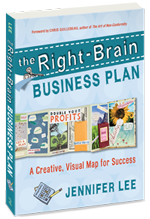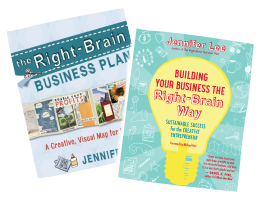INTERVIEW QUESTIONS
for The Right-Brain Business Plan
 1. Why do we need to do business differently in the new creative economy and how can the Right-Brain Business Plan help?
1. Why do we need to do business differently in the new creative economy and how can the Right-Brain Business Plan help?
The left-brain analytical skills that used to get people ahead in the knowledge economy are no longer enough. In the creative economy, right-brain skills like big picture thinking, play, emotional intelligence, and design help us innovate and give us a competitive advantage. The Right-Brain Business Plan helps creative entrepreneurs leverage their natural creative genius to succeed in the new economy. It invites business owners to think visually, to imagine and play, to connect emotionally with their company and customers, and to have fun making a living doing what they love.
2. Why is it important for entrepreneurs to have a business plan?
A business plan is a roadmap that helps articulate the vision of where you want to go and the details of what it’s going to take to get there. The Small Business Administration estimates that 50 percent of small business in America fail within their first five years. Lack of planning is often to blame. Not having a business plan is like driving without directions to an unknown destination.
3. What are the top three things that stop creative types from doing a business plan?
First off, creative types and solopreneurs assume that business plans are only for large corporations or for those seeking funding. But since a business plan is a roadmap to success, even a one-person crafter operating out of her kitchen would benefit from having a clear plan. Secondly, creative types are often intimidated by the dry format of traditional business plans. The Right-Brain Business Plan, however, invites you to make your plan a work of art that inspires you. And lastly, creative types are usually too busy doing the work that they love that they don’t pause and to plan. What they don’t realize is that planning can actually be a very creative process that leverages their natural right-brain gifts.
4. What is a Right-Brain Business Plan? And how is it different from a traditional business plan?
Typically business plans are boring. lengthy, written documents and financial reports that get placed in a binder and never looked at again. A Right-Brain Business Plan, on the other hand, is a visual, creative and fun work of art that provides constant inspiration and guidance. The Right-Brain Business Plan has the same basic building blocks as a traditional plan, but because we approach the planning through pictures, colors, emotion, and intuition, it’s business planning for the rest of us. Some creative formats include a leather cuff bracelet, a paper plate mobile, and an altered children’s picture book decorated with glitter and feathers.
5. You challenge the concept that a business plan has to be a stodgy, boring, traditional document. Why take a right-brain approach to business planning? What are the benefits?
Normally we think of business planning as a very left-brain activity that involves tons of research and analysis. When creative entrepreneurs start with a traditional left-brain approach they usually suffer from analysis paralysis. They get stuck because their left-brain is constantly questioning, judging, and wanting every little detail to make sense before taking that first step. When you approach the business planning with your right-brain first, you free your mind to see creative options, explore, and find patterns and purpose. You allow yourself to dream big and to connect emotionally with your vision. You create space for innovation to happen. You can always ask an expert about how to read a profit and loss statement, but you can only ask yourself about what matters most to you and your business.
6. Creative entrepreneurs often feel challenged by the numbers and asking for money. What suggestions do you have for them to overcome these challenges?
First, become aware of your limiting beliefs and how those keep you stuck and confused. Next, keep in mind that financial planning can be more art than science since you have to do a lot of guesstimating about how much things will cost or how much money you’ll make. Seek expert help by investing in a bookkeeper and accountant. And remember that once you start tracking your income and expenses, it will be easier to make sense of what’s going on with your numbers. You can see trends and can make better decisions once you have a history to work from.
7. Being an entrepreneur often means you’re working on your own. What advice do you have for people to get support in their business?
Just because you work for yourself, doesn’t mean you have to go it alone. One simple, no-cost way to get support in your business is to find an accountability buddy. This is someone you meet with regularly either in-person or on the phone to report progress, talk through issues, and celebrate successes. You might consider working with a mentor who can show you the ropes. I also suggest writing what I call a helping hands wish list. This is a list of all the things you need help with in your business. Use it to identify where you might want to hire some expert help like a graphic designer or bookkeeper. And finally, people won’t know you need help unless you ask, so practice making clear requests.








